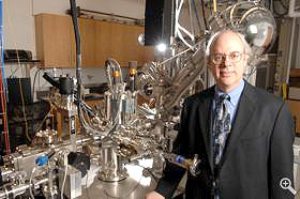Aug 14 2013
The University of Chicago’s Institute for Molecular Engineering has named a director for its water research initiative. Steven Sibener, the Carl William Eisendrath Distinguished Service Professor in Chemistry and the James Franck Institute, will serve as the initiative’s director for a two-year term. His appointment became effective July 1.
 The Institute for Molecular Engineering has appointed Steven Sibener as the director of its water research initiative. Sibener is the Carl William Eisendrath Distinguished Service Professor in Chemistry and the James Franck Institute. Photo by Dan Dry
The Institute for Molecular Engineering has appointed Steven Sibener as the director of its water research initiative. Sibener is the Carl William Eisendrath Distinguished Service Professor in Chemistry and the James Franck Institute. Photo by Dan Dry
The institute formally launched its water initiative this June in collaboration with researchers at Ben-Gurion University of the Negev and Argonne National Laboratory. The initiative will apply the latest discoveries in nanotechnology to create new materials and processes for making clean, fresh drinking water more plentiful and less expensive by 2020, as well as technologies for using water more effectively in industry and agriculture.
“Steve’s experience with the University, with the creation of the Institute for Molecular Engineering and other important centers and institutes, and his distinguished career in physical chemistry make him a valuable and obvious choice for this leadership position,” said Matthew Tirrell, the institute’s Pritzker Director. “He will be responsible for strategic planning, organizational development and operational management of the initiative.”
Sibener specializes in chemical physics, materials research and nanoscience. He is the former director of UChicago’s James Franck Institute and of its Materials Research Science and Engineering Center.
Sibener headed the two University committees charged by the president and the provost with assessing the possibility of establishing a formal molecular engineering program at UChicago, which occurred in 2011. Previously, he was founding director of two national science centers, the Department of Defense-funded Center for Materials Chemistry in the Space Environment that spanned seven universities, and the 10-university, National Science Foundation chemical innovation program’s Center for Energetic and Non-equilibrium Chemistry at Interfaces.
His honors include the American Chemical Society’s Arthur W. Adamson Award for Distinguished Service in the Advancement of Surface Chemistry, the Marlow Medal of the Royal Society of Chemistry, and the American Vacuum Society’s Prairie Chapter Outstanding Research Award. He is a fellow of the American Physical Society and of the American Association for the Advancement of Science.
“Matt Tirrell is a singular leader. He is adding elements to the University that we’ve never had. I find especially engaging the idea of directing a part of this molecular engineering effort with him,” Sibener said. “I’m also excited to become part of this institute because I’ve seen how it has grown in just two years.”
During that time the institute has become transformed from a concept to a new and growing academic enterprise with the appointment of its founding director and three more of its first faculty members. Construction also has begun on the William Eckhardt Research Center, which will house the new institute and significant portions of the Physical Sciences Division.
As for the task ahead, Sibener said, “How to make clean water and how to conserve water is a worthy technical challenge for science and engineering. What technologies can be refined and which ones need to be invented, especially with the advent of the age of nanoscience?”
Desalinization is an example. “Anyone with enough energy can make clean water using desalinization. The question is, can that process be made more efficient?”
The first water resource projects that the institute will tackle will be determined by a grants competition that is already under way. Sibener noted that the next stage of the water initiative may involve policy and economics.
“In many ways the University is exceedingly well placed to tackle the profound societal questions associated with water resources and utilization, including the education of the next generation of leaders in this area of research,” he said. “The questions require, of course, technical solutions, but are also directly related to global policy and economic implementation. I am honored to take on a leadership role in addressing this challenge.”